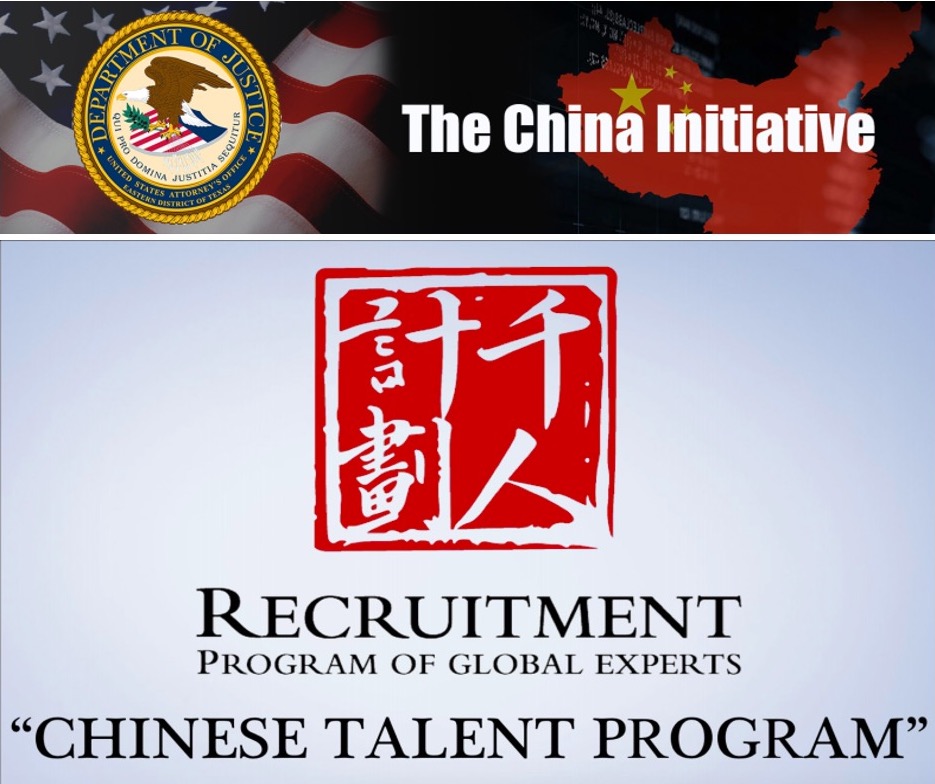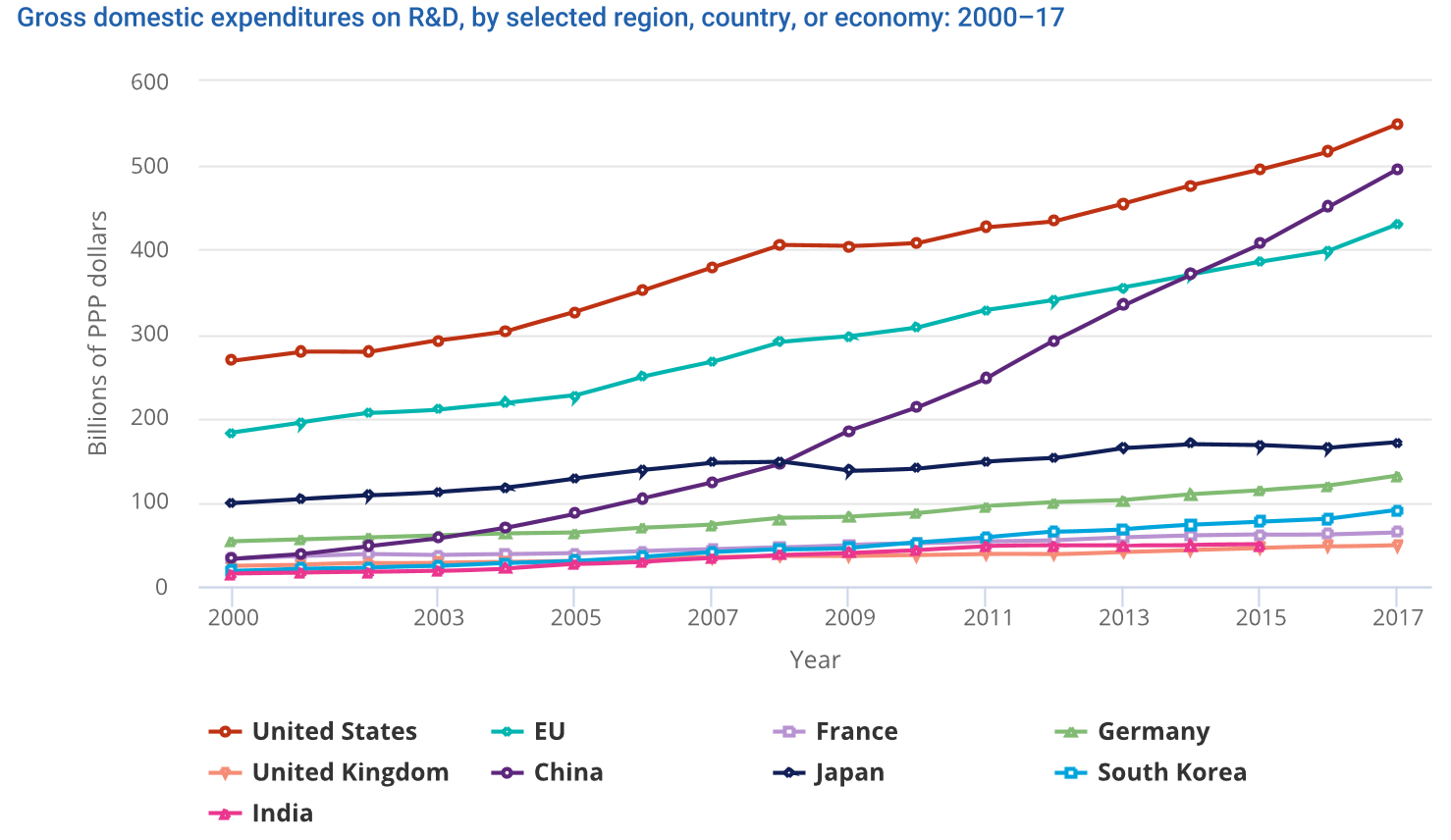
Experts call on U.S. to end China Initiative, up counterspy game without racial profiling
The Chinese government attracts expatriate Chinese experts back to China through its Recruitment Program of Global Experts. The United States’ China Initiative was developed domestically to counter economic and scientific espionage threats from China. The OECD and the EUIPO have documented the economic toll these activities take on the United States and firmly established their connection to China. (Images from the U.S. Department of Justice (top) and National Institutes of Health.)
Targeting of Asian and Asian-American scientists seen as widespread and a threat to U.S. scientific progress.
Scientists and civil rights advocates are calling on the U.S. government to end its China Initiative and find ways to combat economic, industrial, scientific, and technical espionage without resorting to racial profiling. On Oct. 7 a journalist, a scientist, a former federal intelligence official, and a civil rights lawyer discussed the issue during the Council for the Advancement of Science Writing’s New Horizons in Science briefings at the virtual ScienceWriters2021 conference.
The United States loses between $200 billion and $250 billion annually to intellectual property theft and economic espionage, according to the 2017 Special 301 report by the U.S. Trade Representative. Corroborating the report’s findings that China is a major home for this activity, the intergovernmental Organization for Economic Co-operation and Development and the European Union Intellectual Property Office reported that the Chinese government is largely responsible. An intensification of U.S. counterintelligence directed toward China has resulted in charges of racial profiling of Asian-Americans, with concomitant adverse effects on the social climate and a potentially chilling effect in the world of science.
In 2018, the then U.S. Attorney General announced the creation of the Department of Justice’s China Initiative to “identify priority Chinese trade theft cases, ensure that we have enough resources dedicated to them, and make sure that we bring them to an appropriate conclusion quickly and effectively.”
The initiative has resulted in nearly 5,000 active counterintelligence cases, almost half of which are related to China, said Frank Figliuzzi, a former FBI assistant director for counterintelligence and espionage investigations. But critics of the initiative say it is deeply flawed by overzealous investigations and unfair targeting of American citizens and permanent residents of Asian descent, and that it hinders scientific progress by making the U.S. a hostile environment for international scholars.

One of the prominent voices of criticism belongs to physics Nobel laureate Steven Chu, who served as the U.S. Secretary of Energy during the Obama administration. He is among 177 Stanford faculty members who, on their Winds of Freedom website, published an open letter to U.S. Attorney General Merrick B. Garland urging him to end the China Initiative, saying it has unduly targeted Asian-American scientists and also brought charges other than espionage against some.
“Racial profiling is counterproductive and potentially harmful to United States research and global technology competitiveness,” Chu told science writers at the conference, citing examples from personal experience of Asian graduate students and postdoctoral fellows rejecting offers to do research in the U.S. because they feared the effects of the U.S. government’s hostility toward Chinese researchers.
Gisela Perez Kusakawa, a staff attorney at the civil rights group Asian Americans Advancing Justice, described cases of Asian-American professors who were accused of alleged misconduct such as money transfers and failing to disclose on visa application their ties with the Chinese government. Kusakawa noted that the alleged acts were unrelated to espionage and did not violate their university employers’ policies. Her group started its Anti-Racial Profiling Project to address the uptick in investigations and judicial targeting of Asian-Americans, from legal and policy advocacy angles. The project has so far supported more than 70 people. At the same time, the broader group continues to urge the U.S. Congress to end the China Initiative.
Figliuzzi said the real and complex threat of theft and counterfeiting of intellectual property and copyrights cannot be ended; it can only be mitigated. “In the West there are two types of companies: those that know they have been hacked, and those that have been hacked but don’t realize it yet,” he said, a fact that raises the question of whether U.S. counterintelligence can avert such threats without undermining the democratic values upon which the nation is founded.
Writing objectively about these complex topics at the intersection of civil rights and national security is a balancing act, said author and freelance science writer Beryl Benderly. In the case of the China Initiative, journalists need to make two critical distinctions: between the Chinese government and Chinese people, and between basic scientific research and proprietary industrial or military research.
Urging the U.S. government to focus counterintelligence on proprietary research, Kusakawa also called on universities to ensure that their policies are compatible with relevant federal policies, and to educate and protect their international students and faculty who might become targets of racial profiling.